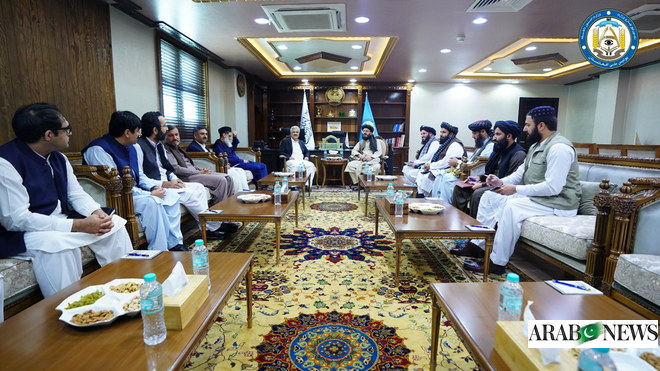Azerbaijan is encouraging Pakistani companies to take advantage of the international transport corridor connecting the two countries.
ISLAMABAD: Azerbaijan’s Foreign Minister Jayhun Bayramov on Thursday urged Pakistani businessmen to take advantage of the opportunities offered by the international transport corridor passing through the country with an eye towards expanding regional trade and connectivity.
Bayramov arrived in Islamabad on Wednesday night for a two-day visit and met with Pakistan’s Deputy Prime Minister Ishaq Dar and held delegation-level talks. According to Pakistan’s foreign ministry, the two sides reviewed developments in bilateral relations and exchanged views on regional and global situations.
Leveraging its strategic geographic location, Pakistan has sought to strengthen its role as a vital trade and transport hub connecting the countries of Central Asia with the rest of the world.
One of the major international transport corridors that Pakistan can use to enhance its regional trade is the Transcaspian International Transport Route (TITR), also known as the Central Corridor. This route starts from Southeast Asia and China, crosses Kazakhstan, and connects to Azerbaijan through the Caspian Sea. From there, the route continues to Georgia, Turkey, and Europe. This route is widely used in both directions.
“We invite Pakistani business representatives to explore the opportunities offered by the international transport corridor passing through the territory of Azerbaijan and the Baku International Sea Trade Port,” Bayramov said at a joint press conference with Dar in Islamabad.
The Port of Baku is located at a key crossroads between Europe in the west, Asia in the east and the Middle East in the south, and serves as a hub connecting these three major regions.
Pakistan-Azerbaijan ties have strengthened recently, especially in the areas of defense, energy and trade. Last year, the two countries signed an agreement for discounted supplies of LNG from Azerbaijan to Pakistan to boost Pakistan’s energy reserves.
Pakistan is also seeking to boost its status as a key trade hub connecting Central Asia to the world through the ambitious China-Pakistan Economic Corridor (CPEC) project. China is investing more than $65 billion in the energy infrastructure corridor, which is aimed at strengthening ties between the two countries and improving Pakistan’s infrastructure.
Bayramov noted that Azerbaijan is also investing heavily in railway infrastructure on its territory and in neighboring regions.
“At the same time, we are aware of the China-Pakistan Economic Corridor (CPEC) and we believe that when we talk about connectivity and trade participation of the two countries, the transit transport aspect of this project can also have very good synergies and we see great potential here and this was one of the topics of today’s discussion,” the Azerbaijani foreign minister said.
Pakistan has been seeking third-party investment in CPEC and has invited Saudi Arabia, Turkey, Germany, the UAE, Iran, Indonesia and Afghanistan to participate in the multi-billion dollar project, but there has been no progress in that regard.
Meanwhile, Dar said the two countries agreed to further strengthen multifaceted cooperation in the areas of trade, investment, connectivity, security, energy and defence.
The Deputy Prime Minister also sought Azerbaijan’s support in Pakistan’s elections for a non-permanent seat on the United Nations Security Council (UNSC), which it is seeking for its eighth term.
Elections for five of the ten non-permanent seats on the UN Security Council for 2025-26 are scheduled for June 6.
“This is your chance to [Azerbaijan] “We have received tremendous support for our country’s candidacy for the upcoming UN Security Council elections on the 6th of next month,” Dar added.
“Pakistan’s Advantageous Location”
Taimur Ali, who works at the Islamabad Institute of Strategic Studies’ Central Asia division, said Pakistan’s increasing inclination to maintain beneficial bilateral and multilateral ties with Central Asian countries stems from Islamabad’s Comprehensive National Security Policy, 2022.
“Apart from this, the tilt towards Central Asian countries is also a factor in the overall Eurasian integration process as Pakistan’s strategic location is very favourable and it acts as a zipper connecting the Central and South Asian countries,” he told Arab News.
He said Pakistan wanted to maintain connectivity with Central Asian countries through CPEC and derive maximum benefits from this mega project.
“Since Central Asian countries are geographically very close to Pakistan and CPEC-related projects, it is natural for Pakistan to invite all Central Asian countries to invest and participate in CPEC projects,” he explained.

